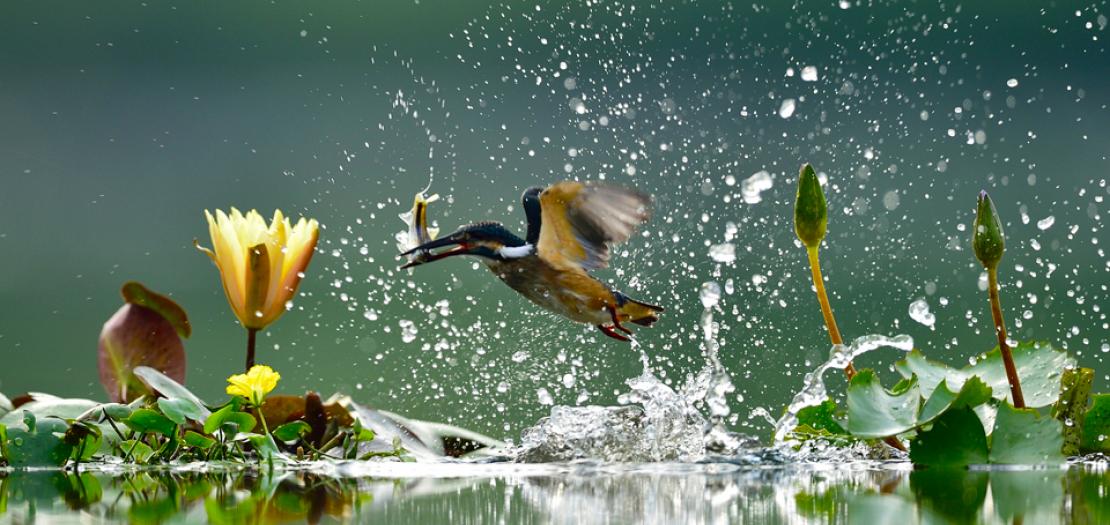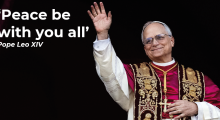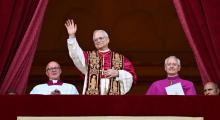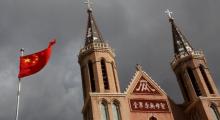Issued by the Catholic Center for Studies and Media - Jordan. Editor-in-chief Fr. Rif'at Bader - موقع أبونا abouna.org

Pope Francis has lamented that St. Francis' Canticle of Creation praising the environment, is turning into an "anguished cry" and plea for help as the environment deteriorates.
The Holy Father made this dire observation in his Message for the annual World Day of Prayer for the Care of Creation, observed by the Church on September 1.
The Holy Father first instituted the World Day of Prayer for the Care of Creation within the Catholic Church in August of 2015.
The ecumenical phase begins on September 1st with the World Day, and concludes on October 4th, with the feast of Saint Francis.
It is a special time for all Christians to pray and work together to care for our Common Home.
Anguished plea of mistreatment
The Pope's message began observing how, when listening, we can hear in the voice of Creation, a kind of "dissonance."
"On the one hand, we can hear a sweet song in praise of our beloved Creator; on the other," he said, "an anguished plea, lamenting our mistreatment of this our Common Home."
The sweet song of Creation, the Pope noted, invites us to practice an “ecological spirituality,” attentive to God’s presence in the natural world.
The Pope invited the faithful to join St. Francis of Assisi in singing: “Praise be to you, my Lord, for all your creatures,” and the psalmist in singing, “Let everything that breathes praise the Lord!”
"Prey to our consumerist excesses," he said, "she weeps and implores us to put an end to our abuses and to her destruction. Then too, there are all those different creatures who cry out."
He recalled the "countless species dying out and their hymns of praise, silenced."
The cry of the poor, native peoples, our children
Recalling the poorest among us who are crying out, the Pope said: "Exposed to the climate crisis, the poor feel even more gravely the impact of the drought, flooding, hurricanes and heat waves that are becoming ever more intense and frequent".
He also recalled the suffering of indigenous peoples. "As a result of predatory economic interests, their ancestral lands are being invaded and devastated on all sides, “provoking a cry that rises up to heaven.”
Finally, he recalled "the plea" of our children.
Time to repent and change
Listening to these anguished cries, he said, we must repent and modify our lifestyles and destructive systems.
We are called, he said, to a new relationship with God, others and Creation. "The present state of decay of our Common Home, the Pope suggested, is not secondary to other global challenges and tragedies, noting it must be given the same attention.
The Pope called for nations to act, especially at the upcoming UN conferences dedicated to the environment this year.
Ambitious steps necessary at COP27 and COP15
COP27 on climate change in Egypt in November, the Pope said, represents the next opportunity for all to join in promoting the effective implementation of the Paris Agreement.
"For this reason, too," he pointed out, "I recently authorized the Holy See, in the name of and on behalf of the Vatican City State, to accede to the UN Framework Convention on Climate Change and the Paris Agreement, in the hope that the humanity of the 21st century will be remembered for having generously shouldered its grave responsibilities.”
The Pope observed that the effort to achieve the Paris goal of limiting temperature increase to 1.5°C "is quite demanding," noting "it calls for responsible cooperation between all nations in presenting climate plans or more ambitious nationally determined contributions in order to reduce to zero, as quickly as possible, net greenhouse gas emissions."
Need 'covenant' between people and environment
This means, he appealed, "for 'converting' models of consumption and production, as well as lifestyles, in a way more respectful of Creation and the integral human development of all peoples, present and future, a development grounded in responsibility, prudence/precaution, solidarity, concern for the poor and for future generations."
The Pope said the transition brought about by this conversion "cannot neglect the demands of justice," especially for workers significantly affected by climate change's impact.
Nations must agree on four key principles
The COP15 summit on biodiversity to take place in Canada in December, the Pope said, "will offer to the goodwill of governments a significant opportunity to adopt a new multilateral agreement to halt the destruction of ecosystems and the extinction of species."
The Pope called for all efforts to halt the further collapse of biodiversity, "our God-given “network of life,” and asked for prayers that nations agree on the following four "key" principles:
- Constructing a clear ethical basis for the changes needed to save biodiversity,
- Ccombating the loss of biodiversity, supporting conservation and cooperation, and satisfying people’s needs in a sustainable way;
- Promoting global solidarity in light of the fact that biodiversity is a global common good demanding a shared commitment,
- Giving priority to people in situations of vulnerability, including those most affected by the loss of biodiversities, such as indigenous peoples, the elderly and the young,
"How can we fail to acknowledge the existence of an “ecological debt” incurred by the economically richer countries, who have polluted most in the last two centuries," the Pope said, stressing, "this demands that they take more ambitious steps at COP27 and at COP15."
The Pope said delay on the part of others, can never justify our own failure to act.
Decisive action necessary as we approach breaking point
As we reach "a breaking point," the Pope warned, "It is necessary for all of us to act decisively."
The Pope prayed that these two meetings work to unite the human family "in effectively confronting the double crisis of climate change and the reduction of biodiversity."
Pope Francis concluded by inviting faithful and people of goodwill to "hear that plea and respond to it with deeds, so that we and future generations can continue to rejoice in Creation’s sweet song of life and hope."







